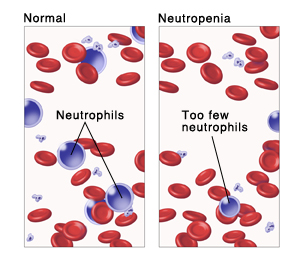Neutropenia
Neutropenia
White blood cells (WBCs) help protect the body from infection. Neutrophils are a type of white blood cell. Their main job is to help the body fight bacterial and fungal infections. Neutropenia occurs when there are fewer neutrophils in the blood than normal. It can range from mild to severe. This depends on the number of neutrophils in the blood. Severe neutropenia puts a person at higher risk for having more infections. Bacterial and fungal infections are most common. Your doctor can tell you more about your condition and whether it needs to be treated.
What causes neutropenia?
There are 2 main types of neutropenia: congenital and acquired. Each type has many causes:
Congenital neutropenia. These are the types that are present at birth. They are caused by certain rare genetic conditions, such as Kostmann’s syndrome. Most often the neurtropenia is mild and normal for certain ethnic groups.
Acquired neutropenia. This type is not present at birth. Causes include:
Certain medicines, such as antibiotics and chemotherapy medicines
Certain autoimmune conditions
Certain viral, bacterial, or parasitic infections
Too little folate or vitamin B-12 in the diet
Underlying bone marrow problem, such as leukemia or myelodysplastic syndrome (MDS)
Other causes
How is neutropenia diagnosed?
Your healthcare provider may check for neutropenia if you have frequent infections. Your provider may also check for neutropenia if you’re having certain treatments, such as chemotherapy, which is known to cause a lower neutrophil count. Tests will be done to confirm the problem. These may include:
A complete blood cell count (CBC). This test measures the amounts of the different types of cells in your blood. This includes the WBCs. The WBC count can be broken down further to find the number of neutrophils and immature neutrophils (bands) in your blood. This is called an absolute neutrophil count (ANC).
A blood smear. This test checks for the different types of blood cells in your blood and how they appear. A sample of your blood is spread on a glass slide and viewed under a microscope. A stain is used so the blood cells can be seen.
A bone marrow aspiration and biopsy. This test checks for problems with how your bone marrow makes blood cells. A needle is used to remove a sample of the bone marrow in your hipbone. The sample is then sent to a lab to be tested for problems.
How is neutropenia treated?
If there is a clear cause of neutropenia, it is addressed. For instance, if a medicine is the cause, it may be stopped or changed.
For mild cases, often no treatment is needed.
For moderate to severe cases, treatment is likely needed. This may include:
G-CSF (granulocyte-colony stimulating factor). This is a special type of protein. It helps promote the growth and activity of neutrophils. G-CSF is given by injection.
Bone marrow transplant. This treatment replaces diseased bone marrow cells with healthy cells from a matched donor. This treatment is only done in specific severe cases.
What is the long-term outcome of neutropenia?
The outcome of neutropenia varies for each person. For some people, neutropenia may resolve after a few weeks or months. For other people, it may be long-lasting. In these cases, ongoing care and treatment is needed. Your healthcare provider will talk to you more about what to expect from your condition.
When to call your healthcare provider
Call your healthcare provider right away if you have any of the following:
Fever of 100.4°F (38°C) or higher. Call 911 or 24-hour urgent care. This is especially important if you have severe neutropenia, which puts you at higher risk for life-threatening infection.
Cold sweat or chills
Chest pain or trouble breathing
Sore throat
Extreme tiredness or fatigue
Nausea and vomiting
Redness, warmth, or drainage from any open cuts or wounds
Pain or burning with urination; frequent urination
Pain, burning, or bleeding in the rectum
Severe constipation or diarrhea
Bloody stool or urine
How can I prevent infections?
With neutropenia, you need to take extra care to protect yourself from infection. Be sure to:
Wash your hands often, especially before eating and after using the bathroom. Use warm water and soap. Or use a hand gel that contains at least 60% alcohol.
Avoid close contact with others who may be ill.
Clean items you use often with disinfectant wipes. This includes phones and computer keyboards.
Avoid touching your eyes, nose, and mouth, especially if your hands are not clean.
Practice good oral hygiene. Use a soft toothbrush. Also, brush and floss your teeth gently.
Always wipe from front to back after a bowel movement.
Keep cuts and scrapes clean and covered until they heal.
Avoid sharing items such as towels, toothbrushes, razors, clothing, and sports equipment.
Store and handle foods safely to prevent food-borne illness.
Ask your healthcare provider if you need to take antibiotics before and after having any dental or medical procedures.
Ask your healthcare provider if you need to wear a special mask near construction sites or farm areas.
Updated:
October 07, 2017
Sources:
Approach to the adult with unexplained neutropenia, Up To Date, Congenital neutropenia, Up To Date, Management of the adult with non-chemotherapy induced neutropenia, Up To Date, Overview of neutropenia in children and adolescents, Up To Date
Reviewed By:
Freeborn, Donna, PhD, CNM, FNP,Gersten, Todd, MD,Image reviewed by StayWell medical illustration team.
